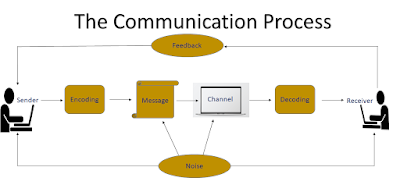Ineffective communication can lead to the failure of a
project and even closure of a process or an organization. Communication is very
crucial at work. A superior should be able to communicate effectively with
their team members. The communication gap at work can lead to chaos, delay in
projects or work on time, prioritizing secondary work instead of the primary
work, and misleading the team from their core objectives. It is crucial as a
leader to have excellent communication skills and to give out clear messages.
Active Listening
Active listening is one of the crucial elements to be a good
communicator. Nobody likes to communicate with a person who doesn’t listen. It
creates a wall between two people. The person who is talking will feel
disconnected and might not share their ideas and views in the future. A person
who actively listens will ask the right questions and understand what the other
person is trying to say. If a person actively listens, they will be able to
demonstrate empathy or appreciation when required during the conversation. Most
importantly, you will be able to respond appropriately in the right context.
Flexible and open
mind
When you listen to your peers, supervisors, or subordinates,
keep an open mind. If you receive feedback or have to be part of a conversation
that you’re not in agreement with, listen to the person and try to understand
the perspective of the other person with an open mind. Avoid getting into an
argument when you are having a difficult conversation. Always keep an open mind
and avoid any ego clashes when you're communicating on topics that you're not
in agreement with.
Clarity
Be clear about what you want to communicate. Unclear
messages can lead to failure in handling a team, failure of a project, and even
misunderstandings between team members. In this digital age, where companies
send out messages through social media platforms, they must be careful in
sending the right messages to their customers. The digital team needs to be
clear and precise about the messages and posts they share with customers.
Unclear messages can have a huge impact on your brand and your overall position
in the market.
Trust and Respect
Trust and respect will encourage your peers or subordinates
to approach you. A leader should lead by example, and earn the respect of their
employees through his or her work. When you work with honesty and integrity and
prove that you have the skills to be where you’re, everyone else will respect
you.
Collaboration and
team bonding
Digital Communication
Digital Communication tools have helped in easy and quick
communication. Project managers and leaders can create communication groups for
their teams, and they can instantly pass on the message. This eliminates
communication gaps, and everyone receives the same message.
Communication is effective when everyone receives and
understands the same message. It is essential to have effective communication
when you’re running a project, leading a team or an organization, and when
communicating with your employees, peers, and supervisors. If the communication
chain breaks, it can even lead to monetary losses or losing out on talented and
skilled employees. It is imperative to be clear with your communication. No
business or organization can succeed without an effective communication between
its employees, employers, customers, and partners.




Comments
Post a Comment